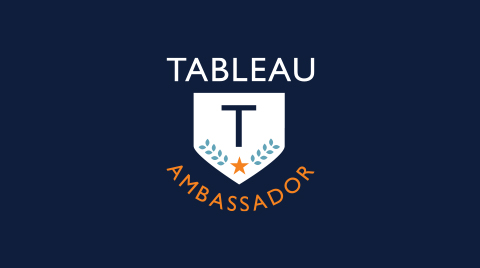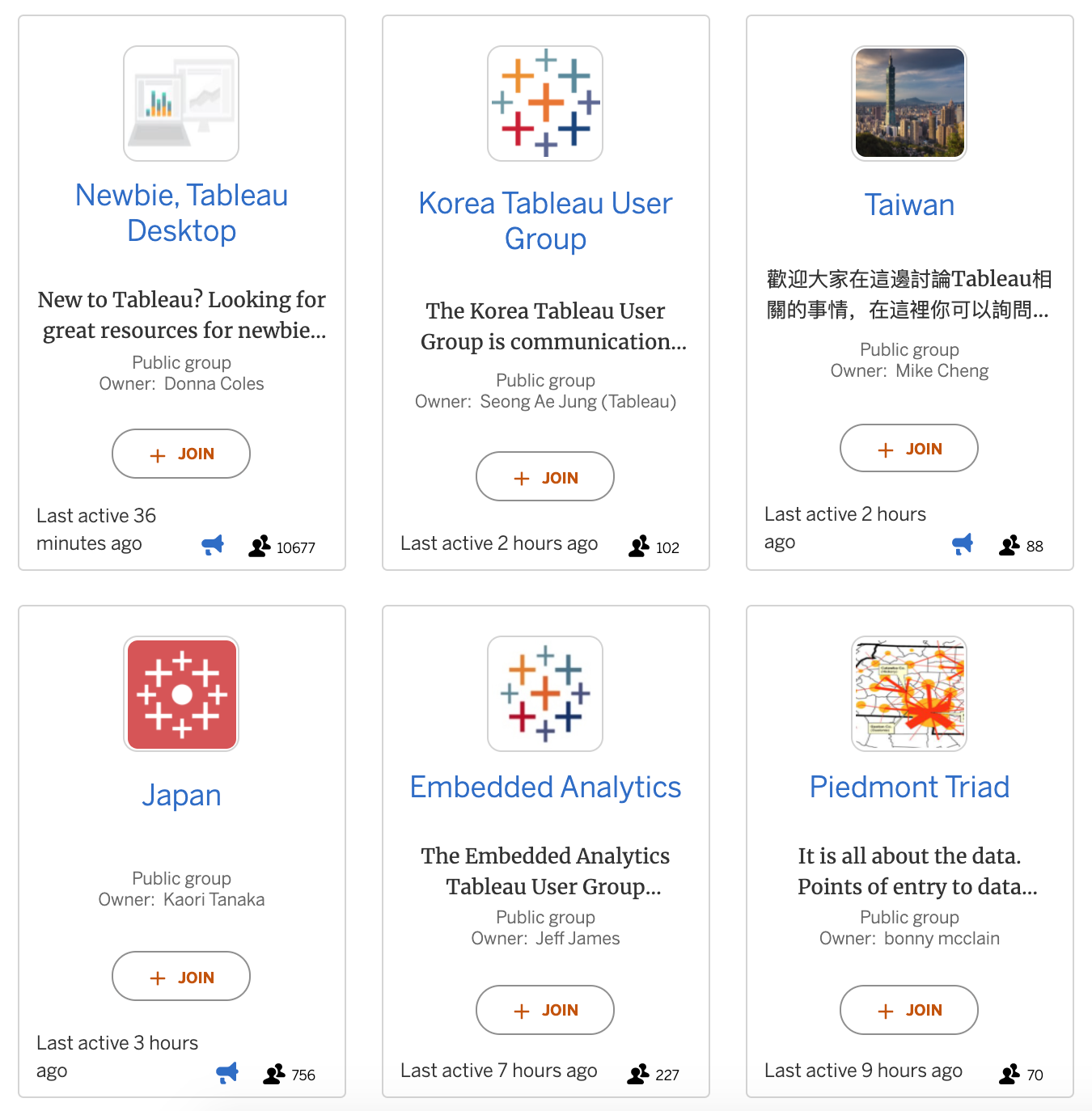The Tableau Ambassadorship Program celebrates individuals who make significant contributions to the global Tableau community – including helping shape platform innovation, assisting others to troubleshoot their issues, or drive the data conversation forward on social media.
Every year, the community is responsible for nominating potential ambassadors. Similar to the Salesforce MVP program, Tableau ultimately decides who becomes an ambassador after reviewing the community picks, seeing their fit in the cohort section, and reviewing their metrics. They have their work cut out to trim hundreds of potential candidates to a few new ones each year!
Ambassadorship is a one-year commitment. The benefits of becoming a Tableau Ambassador include a complimentary Tableau Desktop and Prep license, a direct link to Tableau employees, and great swag.
Last year, I was selected as one of 22 Tableau Social Media Ambassadors. Shortly after, I covered my initial thoughts in a blog post. When I joined the community in 2019, it was a long term goal to be an ambassador as it was a validation of the energy I planned to pump into the community. I never thought that it would happen as it did, and it was an incredible honor and after all the selections were made.
My inner analyst helped me better understand how I became an ambassador, and identify the key traits for what makes an excellent ambassador candidate.
Ambassador Section Breakdown
As of 2020, there are six ambassador sections focusing on unique pieces of the Tableau pie (…chart – sorry couldn’t resist).
Most ambassadors are skilled in multiple sections, so it’s in your best interest to specialize in one, but contribute to multiple areas.
Here’s a high-level introduction to each and who fits the ambassador profile.
1. Tableau DataDev Ambassador (AKA Beyond Tableau Innovators)
In 2020, Tableau launched this section showcasing users who embody the Tableau next-level approach. Tableau’s out-of-the-box tools work great, but there are ways to push it beyond with Tableau’s developer tools, and enhance the user experience. Ambassadors here are responsible for helping shape, apply, and create these elevated experiences.
2. Tableau Forum Ambassador (AKA Tableau Problem Solvers)
The Tableau Forum is a one-stop-shop for many users who work with Tableau and have questions or want to help others. Those helpers are people who work hard assisting others to troubleshoot many issues people may encounter when working with such an extensive data visualization tool.
Some people in our community have assisted thousands of people which can easily be assessed by a person’s reputation level. As ambassadors, their role is to continue helping people, help moderate content and provide direction to the forum. The ambassadors here are Tableau experts who are consistent and self-directed leaders with a common goal to help make Tableau more accessible to all.
3. Tableau Public Ambassador (AKA Data Visualization Influencers)
Tableau Public is a fully hosted site to share your data visualizations. It comes with a tool that nearly mirrors the desktop application and provides 10 gigs to share your data visualizations and build your portfolio.


Ambassadors of this program tend to be design and insight tastemakers who inspire thousands of people to pick up the tool. They may viz consistently pushing the boundaries of design, insight, and storytelling while utilizing the tool to its evolving capabilities. In addition, they support others in our community on the site, on social media, and/or tutorials.
4. Tableau Social Media Ambassador (AKA Data Thought and Family Galvanizers)
Our robust community has a growing association of family referred to as #DataFam on Twitter and LinkedIn. Besides frequently creating visualizations, Social Media Ambassadors help others by blogging, speaking, supporting initiatives, and welcoming those who want to be part of the family — they connect people and drive the data conversation forward.
5. Tableau Student Ambassador (AKA Tableau’s Next-Gen Leaders)
Tableau has been a tool for established analysts, but as data visualization has become more robust and accessible, users are getting increasingly younger. The next generation of data visualizers and Tableau practitioners are in college. To help coordinate efforts to help people learn data visualization, Tableau has offered many tools to all students at accredited institutions (including a free desktop license). To help get the word out and expand our outreach, we have college students helping facilitate user groups, guides, demos, etc.
6. Tableau User Group (TUG) Ambassador (AKA Tableau Super Facilitators)
Tableau User Groups are key to connecting people, especially at a regional level, to Tableau experts in a local setting with people you may know in real life. The community leads these groups with Tableau’s support. User groups often organize events with speakers, Tableau updates, demonstrations, and swag while keeping users engaged between meetings and events. Ambassadors are the strongest and committed TUG Leaders and are key to help steer these requisite hubs to spark the next generation of data rock stars.
8 Tips to Become a Tableau Ambassador
Tableau has not released a secret sauce on what the criteria are to determine ambassadorship, but there are ways you can bolster your Tableau Ambassador résumé:
1. Create a data-centric account on Social Media.
Twitter is where a lot of the #DataFam activity happens. People need to know about you to nominate you. Besides that, it takes you out of the viz vacuum and exposes you to a community that will not help but inspires you to do more and be a better data visualizer. If Twitter doesn’t appeal to you, LinkedIn is a great alternative. For best results, participate in Twitter and LinkedIn.
2. Be an active participant in community projects.
Not only does it help you connect, but your work also reaches a larger audience and provides an opportunity to gauge progress.
3. Help others.
Share your Tableau knowledge by creating a blog, YouTube channel, or podcast. Mentor people through MentoringMeetup (a Tableau mentoring site I’m affiliated with), or provide feedback and encouragement to others in the community.
4. Collaborate!
Collaborating in this space is one of the best ways to learn, build relationships, and boost your profile.
5. Create or co-lead an initiative or TUG.
If you are recruited to help as a leader of a Tableau community project, a Tableau User Group, or create an original one, go for it! As long as you have the time and can provide consistent quality leadership and support.
6. Speak.
If asked to speak at a Tableau User Group or a Tableau-related media site, say ‘Yes’! A great bit about this family is even if you aren’t a comfortable speaker, you can feel the uplifting and calming support that will only help you develop in your professional life (and potentially overcome a great fear). Hint: Having and developing a presentation topic is helpful.
7. Be consistent and productive.
Show you are going to be a dedicated community mate for the long haul. Ambassador selections happen in the summer. You can make a huge mark right before the nominations are made, but people have better odds at getting selected if they’ve made a consistently powerful mark for an extended period.
8. Be inclusive and amplify.
Ambassadors represent Tableau’s ideals. Evangelize diversified tech, support issues with positive social impact, push voices forward that have been previously marginalized, and bridge that with your work in data visualization. It’s okay to self-promote, but even better when promoting others more.
Summary
In the DataFam, you can make an enormous personal and professional impression without being an ambassador. If you are a Tableau innovator, problem solver, influencer, galvanizer, next-gen leader, super facilitator in any combination, you are qualified to be an ambassador (or an ambassador-in-waiting).
To have the commitment needed to become an ambassador, it’s essential to consider that ambassadorship isn’t your main goal, and ‘paying it forward’ is because once it’s earned, it will mean so much more and power you to continue to advance Tableau’s X Factor, the #DataFam.
Apply to become a Tableau Ambassador here.
Further reading
- Ambassador Community Hub Page (Tableau Site)
- How to Connect with the Tableau Community (Kevin Flerlage of The Flerlage Twins)
- Tableau Twelve-Step Programme for 2020 (Toan Hoang of Tableau Magicians)




